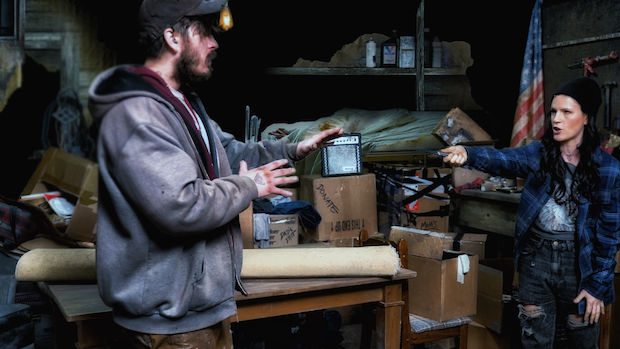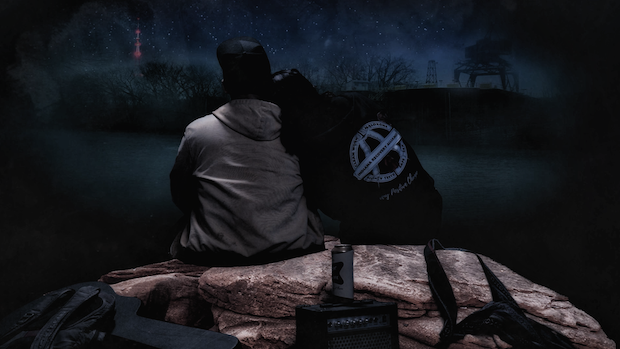Review: Lights on the Radio Tower, a Rock Musical About Heartland Despair
A brother and sister reunite, possibly for the last time, in Emily Goodson and Kevin James Thornton’s streaming musical.

(© Five OHM Productions)
The price of living in a country with dynamic growth and a restless population is that entire communities get left behind by the transforming economy — and that cost is paid most dearly by those who can least afford it. That is the case for the brother and sister at the center of Lights on the Radio Tower, Emily Goodson and Kevin James Thornton's new rock musical about a very awkward family reunion. It is now available for streaming until June 1.
One might be tempted to call Jesse (Max Sangerman) the lucky one, since he skipped town as soon as he could, missing the last two decades of deindustrialization and despair. But one look at his disheveled appearance as he rides the Greyhound back to his Midwestern hometown will disabuse you of that assumption. His sister Molly (Carrie Manolakos) doesn't even recognize him when he walks into their childhood home, which she is cleaning out following their father's death.
Dad's earthly remains now occupy a Folgers can that he once used as an ashtray. Jesse and Molly sift through his belongings and attempt to piece together their estranged relationship. Memories of drunken brawls between their parents mix with happier thoughts about their first gig as a brother-sister band at the local bowling alley, which ended with them drinking a tallboy while gazing at a radio tower across the Ohio River. But is that enough to hold them together as a family?

(© Five OHM Productions)
As a native son of Southern Ohio with an undying reverence for classic rock instilled in me by WEBN, and whose childhood home's basement has transformed into a tiny crypt containing the ashes of dead relatives, I really wanted to love this musical — but I couldn't. The conflicts in Goodson's book feel too contrived, their resolutions too convenient to offer the audience insight about the forces ripping apart American families in the industrial heartland.
Thornton (who is the frontman of the band Indiana Queen) attempts to conjure the spirit of the Midwest with a rock score, but it comes across as imitation Jonathan Larson, stuffed with unprocessed adolescent angst. Lyrics like "Another rumor that you sold plasma for cash / Ain't no transfusion more confusing than that" are more baffling than edgy (Thornton and Goodson collaborated on lyrics). And a comic relief song about a sex dream starring Tom Selleck falls disappointingly flat.
This is despite the fact that Sangerman and Manolakos sell every moment as if they are being paid on commission. Their performances would work better onstage than they do onscreen, but their high-flying rock vocals are irresistible. Lights on the Radio Tower is best when it is just the two of them with a guitar, singing their hearts out. It made me very much want to see their nightclub act.
There are glimmers of what could be a very exciting stage show in director Gabriel Barre's production (this streaming version represents something of a world premiere for a musical that has only received developmental stagings). A flashback in silhouette is particularly striking. Jefferson Ridenour's scenic design suggests a garage floating in a void of memory, while his costumes convey time and place while pushing against stereotype (I particularly appreciated Jesse's emo getup during a flashback to the early aughts). Unfortunately, Barre undermines much of his good work with aggressive postproduction effects, including little starbursts of rage superimposed on the performers. While this seems meant to emphasize the heightened emotion of the moment, it makes a lot of the scenes look like music videos made for a bar mitzvah.
The words "content warning" appear in a radical font at the top of the movie, in what seems like more of a sales pitch than an advisory. "Child abuse, mental illness, off-screen suicide, self-harm, alcoholism, homophobia, and statutory rape" are all promised to be addressed in an overloaded agenda that immediately betrays Lights on the Radio Tower as a working-class answer to the bourgeois musical afterschool special Jagged Little Pill.
Not that this isn't a story that needs to be told, repeatedly, until American theatergoers actually care what is happening to their compatriots. Learn to Code is simply not a satisfactory response to the devastation that has gutted communities and families all across this country, but particularly in the industrial Midwest. I keep hoping that a musical will be able to get that across, and maybe, after some serious renovation, Lights on the Radio Tower can be it.








